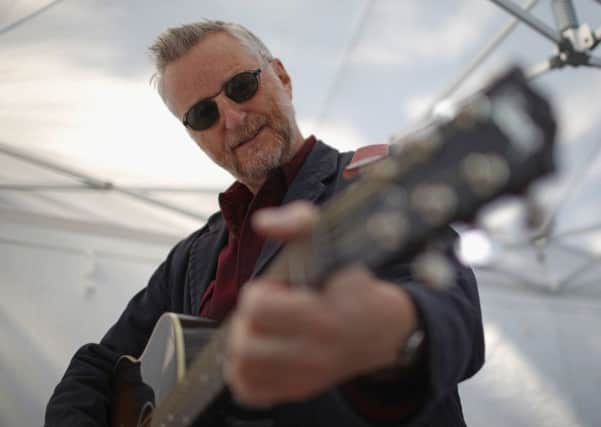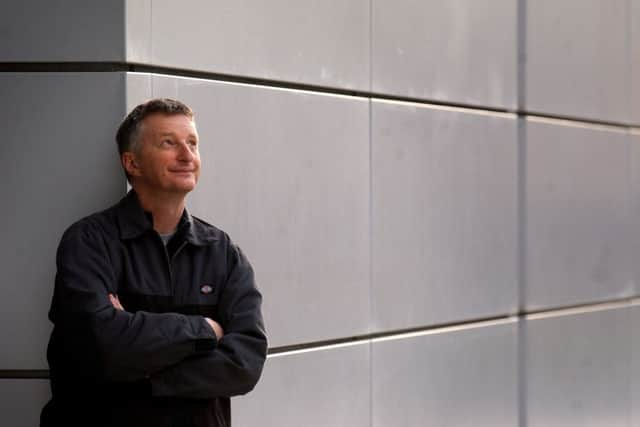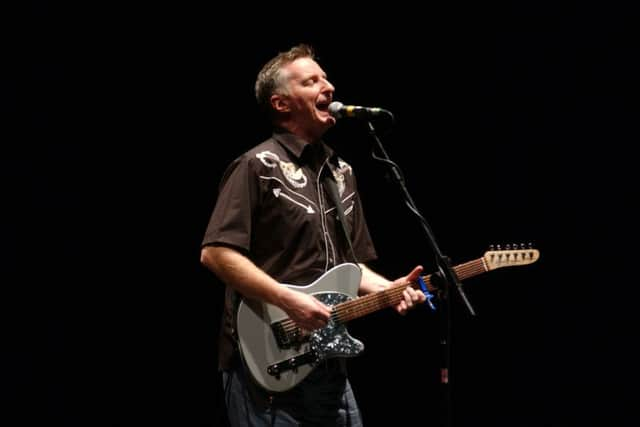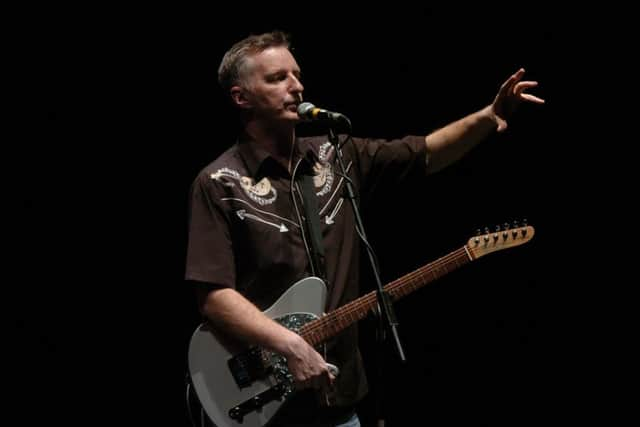Billy Bragg on why his best songs come from the tracks


In the history of modern song, no form of transport has evoked such a romantic response as the railway. The airplane may have a range of classic songs of its own, from John Denver’s Leaving On a Jet Plane on down, but from Elvis Presley singing Mystery Train to Kraftwerk’s Trans-Europe Express, the locomotive inspires visions of escape and exploration.
As a tradition, the train song has been embraced by Essex songwriter and activist Billy Bragg and his old friend from North Carolina Joe Henry, producer of artists including Elvis Costello and Bonnie Raitt. Their forthcoming album Shine a Light is a collection of classic train songs in the 20th-century American tradition, with a particularly devoted and immersive method of recording. Having worked together on Bragg’s 2013 album Tooth & Nail, the pair made Shine a Light on a portable studio while travelling the longest rail line in the United States, setting up on station platforms whenever they had the chance.
Advertisement
Hide AdAdvertisement
Hide AdThe idea stemmed from Bragg’s research for a book about the emergence of the guitar in British popular music, and in particular the work of Lonnie Donegan; he wondered why so many songs played in that period around the late 1950s held a fascination with the railroad. “Why were there so many railroad songs and not so many car songs or boat songs or airplane songs?” he asks. “What is it about the railroad?


“I came to realise that it had created such a profound shift in human experience that it was bound to be deeply embedded in our common culture. I’m talking about the way it transformed the UK in the mid-19th century and particularly America in the latter half of that century, after the Civil War.
“Before the railways came, nobody could go faster than a horse could gallop or a ship could sail, and everything people consumed was made locally. But the railroad allowed people to travel over the horizon and bring things back, and that had a transformative effect. The car and the aeroplane only refined that experience.”
Or, as he puts it, Johnny Cash didn’t sing of the ‘lonesome car horn’ in Folsom Prison Blues. Undertaking a 2014 American photo shoot on the Rock Island Line (the Chicago rail network which inspired a song first recorded by Alan Lomax in an Arkansas prison in the 1930s and covered by Bragg and Henry on Shine a Light), Bragg found himself struck by this “last part of the old, weird America which still functions.” He resolved to make a record of the railroad, rather than about it; one which invites the listener on a journey.
Henry and Bragg have been friends since the late 1980s, introduced by the former’s music publicist wife Melanie, and initially bonded over a shared love of Van Morrison. When Bragg took the idea to Henry, he was enthused. “Even when trains are the primary imagery of these songs, they’re still more about us as a nation – our ambitions, our desires, our tenacity – than the machines themselves,” writes Henry over email. “The size of the US as a country is both a strength and a weakness: our sprawl allows for an immensely diverse and evolving identity, yet we can feel disconnected from one another, and our sense of ourselves as a union can become vague and indistinct. The railroad helped connect and define us.”


The pair set off together on the journey from Chicago to Los Angeles, the longest single Amtrak route in North America, which journeys through the heartland of the country and along the border with Mexico. The route is 65 hours long, with lengthy re-crewing stops in the larger cities; “for more than just a fag break,” says Bragg, which allowed he and Henry to find a waiting room, set up and record a couple of versions of a song. “It’s pretty simple if you’ve ever been a busker,” laughs Bragg. “It gave it a certain energy, you know? The only place we got moved along was in Fort Worth, where we tried to record in front of this beautiful mural of Native American people, but security stopped us so we had to hide behind a train to get it done.”
Very deliberately, the sound of the railroad and the people who use it is all around; in fact, the train whistle placed at the top of the record – the only overdub – was put there deliberately to make the listener aware they could expect to hear back ground noise. The songs were chosen in some places to reflect the background atmosphere, and in others because they had a geographic connection. The pair’s one overnight stop was at the Gunther Hotel in San Antonio, where they recorded in Room 414, once used by Robert Johnson for the same purpose.
Advertisement
Hide AdAdvertisement
Hide Ad“The songs were coming out of a skiffle place,” says Bragg, “because when you break that down it’s essentially Leadbelly’s repertoire; Rock Island Line, Midnight Special, Railroad Bill (all on the album). We had to include a song by the first US pop star, Jimmie Rodgers, who had worked on the railroad – they called him the Singing Brakeman. Early Morning Rain is from the 1960s, it tells of the aeroplane superseding the railway; a hobo sits in the long grass thinking how you can’t jump a jet plane the way you can a freight train.”
This erosion of the railroad’s past is a theme noticed by Bragg on the journey. Chicago Central Station, he says, is a great cathedral to the grandeur of North American rail travel, yet when he and Henry left for San Antonio theirs was the only passenger train departing on the line that day. Nobody traverses the continent by rail any more, they just catch a plane.


“Yet we weren’t just trying to point out what wasn’t there, we also wanted to make a case for what could be there,” says Bragg. “I live in a rural part of Dorset, but half an hour from my house there are two trains every hour to London, whereas in the US the idea of using it as passenger transport has fallen by the wayside. The only people on the railway are people who can’t fly for medical reasons, people who don’t want to show their ID at airports, old guys who used to work on the railroad, and British tourists.
“The idea of a proper high-speed rail link between, say, Los Angeles and San Francisco is a viable one, especially when there’s so much messing around at airports these days. But Amtrak is a weird anomaly in the US in that it’s publicly owned, probably because it’s not profitable enough to run as a business. You can’t even get wifi on the train because they’d have to negotiate with each state they pass through.”
This project, then, speaks as much of America’s present as of its past, of how the view from the railroad ties the country together while flying far above makes it appear fragmentary. Henry talks of pulling out of El Paso and seeing contemporary Texas City and dusty, ancient Juarez across the border spread out before him, a divide which is raw in the minds of Americans in 2016.
“These songs have witnessed and helped to explain our troubled, arrogant, benevolent and beautiful country to ourselves,” he writes. “They’re still alive and have something to say to us; they don’t find their authority in antiquity, but as a living vocabulary inviting us to take them up and speak.”


l Billy Bragg and Joe Henry launch their album Shine A Light: Field Recordings From The Great American Railroad at Summerhall, tonight at 6:30pm. The album is released on 23 September by Cooking Vinyl